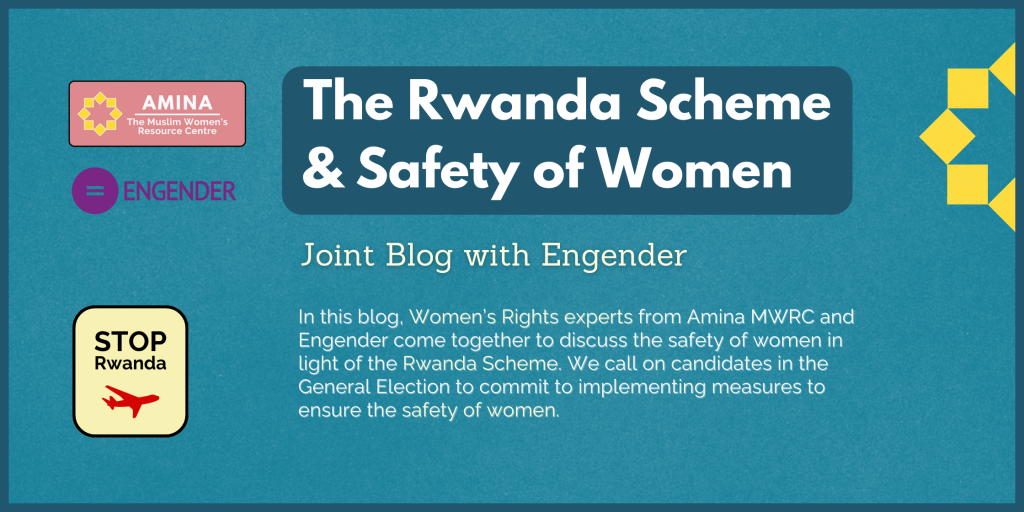
The Rwanda Scheme & Safety of Women

Joint Blog with Engender
Topic: General Election 2024 – Immigration
Trigger Warning: Abuse/SA
In this blog, Women’s Rights Experts from Amina MWRC and Engender come together to discuss the safety of women in light of the Rwanda Act. We call on candidates in the General Election to commit to implementing measures to ensure the safety of women.
Today, we share a special co-authored blog, written in collaboration with our sisters at Engender, Scotland’s feminist policy and advocacy organisation. Together, we focus on immigration and the urgent need to scrap the cruel Rwanda Act in light of the implications for women, drawing upon our joint expertise.
What is the Rwanda Scheme?
We are appalled by the UK government’s Rwanda Scheme, and its persistence to enforce the unethical ‘Safety of Rwanda (Asylum and Immigration) Act 2024’.
This act, which became law on April 25th after receiving Royal Assent, enables the UK government to proceed with its Rwanda Scheme. Despite the UK Supreme Court unanimously ruling the scheme unlawful in November last year, the government has persisted in seeing this through.
The ‘Safety of Rwanda (Asylum and Immigration) Act 2024’ is currently facing multiple legal challenges, including from the FDA union, which represents senior civil servants, and from Asylum Aid.
We stand in solidarity with all those affected by this harmful and cruel scheme, which will disproportionately impact women and minorities.
The Rwanda Scheme Will Cause More Harm
Women seeking asylum are often fleeing from war, trafficking, sexual and gender-based violence, and other forms of abuse. The Rwanda Scheme will not stop people from fleeing these horrors, but will cause them further harm.
In the UK, the immigration system already has a significant impact on many women who reach out to Sahara Scotland, Amina MWRC’s independent domestic abuse advocacy service. Our caseworkers provide crucial support to these women, the majority of whom possess insecure immigration status.
Reflecting on the impacts of the Rwanda Act, Amina highlights several concerns.
Misconceptions & Manipulation
1. Community Misunderstandings
There are widespread misconceptions within the communities served by Sahara Scotland regarding immigration status already. Perpetrators often exploit these misunderstandings to their advantage.
Case Study 1: Sara
Sara was preparing for a wedding with her abuser, when a woman alerted her family to this reality. The family ignored the woman’s warnings, believing their daughter would have a better life in the UK with the abuser and gain secure immigration status. Women like Sara are often left to the whims of their abusive partners.
2. Increased Control by Abusers
The Rwanda Act gives increased control to abusers, especially when legislation is unable to adequately protect women. Women like Sara would be more hesitant to leave an abusive relationship, while the scheme is in place. This results in women enduring abuse and violence at the hand of their partners, and being less likely to seek support.
Increased Coercion
3. Women are at Risk of Increased Coercion
The Rwanda Scheme exacerbates the coercive control women already experience, and further empower their abusers. Perpetrators frequently use victims’ lack of knowledge to their advantage, scaring women into thinking they will be deported if they leave an abusive relationship. With the implementation of the Act, abusers may use the threat of ‘life in Rwanda’ to trap women further.
Women with insecure immigration status already face limited options after leaving an abusive relationship, by either returning to their home country or seeking asylum. For many of these women, returning to their home country means facing honour-based abuse for causing ‘shame’ to their family, which is a situation they fear enduring.
Erosion of Trust
4. Deterioration of Trust in Institutions
The Rwanda Act will further erode trust that women who are victims of abuse have in the UK police and other institutions meant to support them. Many women using Sahara Scotland’s services are already fearful of the British immigration system and hesitant to engage with the police or report abuse. Our caseworkers note that building trust with these women requires significant time and effort.
Safe and Community-Based Accommodation is Essential
Ensuring access to safe and community-based accommodation for women seeking asylum is crucial. Unfortunately, the current system is failing these women.
Case Study 2: Laila
Laila, a woman on a dependent visa, experienced severe sexual abuse from her husband. She left her abuser but felt very unsafe in the homeless accommodation she was assigned. Feeling more secure at her abuser’s flat, Laila returned there. Tragically, upon returning, she was raped multiple times that same evening.This instance is one of many highlighting the inadequacy of homeless accommodation in the UK.
Final Reflections
This blog aims to alert policymakers and the general public to the serious implications of the scheme, and the urgent need for safe accommodation for women who are victims of abuse. In the past, Rwanda has been accused of being unable to fulfill human rights.The Rwanda Scheme violates International Law, robbing the rights of those seeking safety in the UK.
Amina MWRC manages a free and confidential helpline, which serves as a lifeline to many Muslim & BME Women in Scotland. If you are in need of advice, a listening ear, or our specialist services, visit our Helpline page or call 0808 801 0301, Monday to Friday, from 10am to 4pm.
The General Election on 4th July is an opportunity for the next UK Government to prioritise women’s rights and equality. Find out if your local candidates support women’s rights by contacting them directly on the Engender website here.
Engender Scotland is calling on candidates in the upcoming General Election to commit to taking action on four key areas for women, if elected. In their “What’s in it for women?” four-part series, Engender will break down each of the key asks covering health, social security, equal representation and immigration.
Find and email your local candidates with Engender’s pre-written letter here.
Amina MWRC is Scotland’s leading women’s rights organisation for Muslim & BME women. We offer a range of free services, including a Helpline, Domestic Abuse Advocacy, Financial Advocacy, Employability Services, Creative Wellbeing, and Violence Against Women & Girls Prevention workshops.
Find out about our upcoming activities here, or get in touch for your specific queries! For corporate donations, please visit our Fundraising page.

